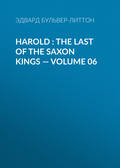
Эдвард Бульвер-Литтон
Godolphin, Complete
CHAPTER XXXIII
RETURN TO LADY ERPINGHAM.—LADY ERPINGHAM FALLS ILL.—LORD ERPINGHAM RESOLVES TO GO ABROAD.—PLUTARCH UPON MUSICAL INSTRUMENTS.—PARTY AT ERPINGHAM HOUSE.—SAVILLE ON SOCIETY AND THE TASTE FOR THE LITTLE.—DAVID MANDEVILLE.—WOMEN, THEIR INFLUENCE AND EDUCATION.—THE NECESSITY OF AN OBJECT.—RELIGION
As, after a long dream, we rise to the occupations of life, even so, with an awakening and more active feeling, I return from characters removed from the ordinary world—like Volktman4 and his daughter—to the brilliant heroine of my narrative.
There is a certain tone about London society which enfeebles the mind without exciting it; and this state of temperament, more than all others, engenders satiety. In classes that border upon the highest this effect is less evident; for in them—there is some object to contend for. Fashion gives them an inducement. They struggle to emulate the toga of their superiors. It is an ambition of trifle, it is true; but it is still ambition. It frets, it irritates, but it keeps them alive. The great are the true victims of ennui. The more firmly seated their rank, the more established their position, the more their life stagnates into insipidity. Constance was at the height of her wishes. No one was so courted, so adored. One after one, she had humbled and subdued all those who, before her marriage, had trampled on her pride—or, who after it, had resisted her pretensions: a look from her had become a triumph, and a smile conferred a rank on its receiver. But this empire palled upon her: of too large a mind to be satisfied with petty pleasures and unreal distinctions, she still felt the Something of life was wanting. She was not blessed or cursed (as it may be) with children, and she had no companion in her husband. There might be times in which she regretted her choice, dazzling as it had proved;—but she complained not of sorrow, but monotony.
Political intrigue could not fill up the vacuum of which Constance daily complained; and of private intrigue, the then purity of her nature was incapable. When people have really nothing to do, they generally fall ill upon it; and at length, the rich colour grew faint upon Lady Erpingham’s cheek; her form wasted; the physicians hinted at consumption, and recommended a warmer clime. Lord Erpingham seized at the proposition; he was fond of Italy; he was bored with England.
Very stupid people often become very musical: it is a sort of pretension to intellect that suits their capacities. Plutarch says somewhere that the best musical instruments are made from the jaw-bones of asses. Plutarch never made a more sensible observation. Lord Erpingham had of late taken greatly to operas: he talked of writing one himself; and not being a performer, he consoled himself by becoming a patron. Italy, therefore, presented to him manifold captivations—he thought of fiddling, but he talked only of his wife’s health. Amidst the regrets of the London world, they made their arrangements, and prepared to set out at the end of the season for the land of Paganini and Julius Caesar.
Two nights before their departure, Lady Erpingham gave a farewell party to her more intimate acquaintance. Saville, who always contrived to be well with every one who was worth the trouble it cost him, was of course among the guests. Years had somewhat scathed him since he last appeared on our stage. Women had ceased to possess much attraction for his jaded eyes: gaming and speculation had gradually spread over the tastes once directed to other pursuits. His vivacity had deserted him in great measure, as years and infirmity began to stagnate and knot up the current of his veins; but conversation still possessed for and derived from him its wonted attraction. The sparkling jeu d’esprit had only sobered down into the quiet sarcasm; and if his wit rippled less freshly to the breeze of the present moment, it was coloured more richly by the glittering sands which rolled down from the experience that over shadowed the current. For the wisdom of the worldly is like the mountains that, sterile without, conceal within them unprofitable ore: only the filings and particles escape to the daylight and sparkle in the wave; the rest wastes idly within. The Pactolus takes but the sand-drifts from the hoards lost to use in the Tmolus.
“And how,” said Saville, seating himself by Lady Erpingham, “how shall we bear London when you are gone? When society—the everlasting draught—had begun to pall upon us, you threw your pearl into the cup; and now we are grown so luxurious, that we shall never bear the wine without the pearl.”
“But the pearl gave no taste to the wine: it only dissolved itself—idly, and in vain.”
“Ah, my dear Lady Erpingham, the dullest of us, having once seen the pearl, could at least imagine that we were able to appreciate the subtleties of its influence. Where, in this little world of tedious realities, can we find anything even to imagine about, when you abandon us?”
“Nay! do you conceive that I am so ignorant of the framework of society as to suppose that I shall not be easily replaced? King succeeds king, without reference to the merits of either: so, in London, idol follows idol, though one be of jewels and the other of brass. Perhaps, when I return, I shall find you kneeling to the dull Lady A–, or worshipping the hideous Lady Z–.”
“‘Le temps assez souvent a rendu legitime
Ce qui sembloit d’abord ne se pouvoir sans crime;”’
answered Saville with a mock heroic air. “The fact is, that we are an indolent people; the person who succeeds the most with us has but to push the most. You know how Mrs. –, in spite of her red arms, her red gown, her city pronunciation, and her city connexions, managed—by dint of perseverance alone—to become a dispenser of consequence to the very countesses whom she at first could scarcely coax into a courtesy. The person who can stand ridicule and rudeness has only to desire to become the fashion—she or he must be so sooner or later.”
“Of the immutability of one thing among all the changes I may witness on my return, at least I am certain no one still will dare to think for himself. The great want of each individual is, the want of an opinion! For instance, who judges of a picture from his own knowledge of painting? Who does not wait to hear what Mr. –, or Lord – (one of the six or seven privileged connoisseurs), says of it? Nay, not only the fate of a single picture, but of a whole school of painting, depends upon the caprice of some one of the self-elected dictators. The King, or the Duke of –, has but to love the Dutch school and ridicule the Italian, and behold a Raphael will not sell, and a Teniers rises into infinite value! Dutch representations of candlesticks and boors are sought after with the most rapturous delight; the most disagreeable objects of nature become the most worshipped treasures of art; and we emulate each other in testifying our exaltation of taste by contending for the pictured vulgarities by which taste itself is the most essentially degraded. In fact, too, the meaner the object, the more certain it is with us of becoming the rage. In the theatre, we run after the farce; in painting, we worship the Dutch school; in–”
“Literature?” said Saville.
“No!—our literature still breathes of something noble; but why? Because books do not always depend upon a clique. A book, in order to succeed, does not require the opinion of Mr. Saville or Lady Erpingham so much as a picture or a ballet.”
“I am not sure of that,” answered Saville, as he withdrew presently afterwards to a card-table, to share in the premeditated plunder of a young banker, who was proud of the honour of being ruined by persons of rank.
In another part of the rooms Constance found a certain old philosopher, whom I will call David Mandeville. There was something about this man that always charmed those who had sense enough to be discontented with the ordinary inhabitants of the Microcosm,—Society. The expression of his countenance was different from that of others: there was a breathing goodness in his face—an expansion of mind on his forehead. You perceived at once that he did not live among triflers, nor agitate himself with trifles. Serenity beamed from his look—but it was the serenity of thought. Constance sat down by him.
“Are you not sorry,” said Mandeville, “to leave England? You, who have made yourself the centre of a circle which, for the varieties of its fascination, has never perhaps been equalled in this country? Wealth—rank—even wit—others might assemble round them: but none ever before convened into one splendid galaxy all who were eminent in art, famous in letters, wise in politics, and even (for who but you were ever above rivalship?) attractive in beauty. I should have thought it easier for us to fly from the Armida, than for the Armida to renounce the scene of her enchantment—the scene in which De Stael bowed to the charms of her conversation, and Byron celebrated those of her person.”
We may conceive the spell Constance had cast around her, when even philosophy (and Mandeville of all philosophers) had learned to flatter; but his flattery was sincerity.
“Alas!” said Constance, sighing, “even if your compliment were altogether true, you have mentioned nothing that should cause me regret. Vanity is one source of happiness, but it does not suffice to recompense us for the absence of all others. In leaving England, I leave the scene of everlasting weariness. I am the victim of a feeling of sameness, and I look with hope to the prospect of change.”
“Poor thing!” said the old philosopher, gazing mournfully on a creature who, so resplendent with advantages, yet felt the crumpled rose-leaf more than the luxury of the couch. “Wherever you go the same polished society will present to you the same monotony. All courts are alike: men have change in action; but to women of your rank all scenes are alike. You must not look without for an object—you must create one within. To be happy we must render ourselves independent of others.”
“Like all philosophers, you advise the impossible,” said Constance.
“How so? Have not the generality of your sex their peculiar object? One has the welfare of her children; another the interest of her husband; a third makes a passion of economy; a fourth of extravagance; a fifth of fashion; a sixth of solitude. Your friend yonder is always employed in nursing her own health: hypochondria supplies her with an object; she is really happy because she fancies herself ill. Every one you name has an object in life that drives away ennui, save yourself.”
“I have one too,” said Constance, smiling, “but it does not fill up all the spaces of time. The intervals between the acts are longer than the acts themselves.”
“Is your object religion?” asked Mandeville, simply. Constance was startled: the question was novel. “I fear not,” said she, after a moment’s hesitation, and with a downcast face.
“As I thought,” returned Mandeville. “Now listen. The reason why you feel weariness more than those around you, is solely because your mind is more expansive. Small minds easily find objects: trifles amuse them; but a high soul covets things beyond its daily reach; trifles occupy its aim mechanically; the thought still wanders restless. This is the case with you. Your intellect preys upon itself. You would have been happier if your rank had been less;” Constance winced—(she thought of Godolphin); “for then you would have been ambitious, and aspired to the very rank that now palls upon you.” Mandeville continued—
“You women are at once debarred from public life and yet influence it. You are the prisoners, and yet the despots of society. Have you talents? it is criminal to indulge them in public; and thus, as talent cannot be stifled, it is misdirected in private; you seek ascendency over your own limited circle; and what should have been genius degenerates into cunning. Brought up from your cradles to dissembling your most beautiful emotions—your finest principles are always tinctured with artifice. As your talents, being stripped of their wings are driven to creep along the earth, and imbibe its mire and clay; so are your affections perpetually checked and tortured into conventional paths, and a spontaneous feeling is punished as a deliberate crime. You are untaught the broad and sound principles of life; all that you know of morals are its decencies and forms. Thus you are incapable of estimating the public virtues and the public deficiencies of a brother or a son; and one reason why we have no Brutus, is because you have no Portia. Turkey has its seraglio for the person; but custom in Europe has also a seraglio for the mind.”
Constance smiled at the philosopher’s passion; but she was a woman, and she was moved by it.
“Perhaps,” said she, “in the progress of events, the state of the women may be improved as well as that of the men.”
“Doubtless, at some future stage of the world. And believe me, Lady Erpingham, politician and schemer as you are, that no legislative reform alone will improve mankind: it is the social state which requires reformation.”
“But you asked me some minutes since,” said Constance, after a pause, “if the object of my pursuit was religion. I disappointed but not surprised you by my answer.”
“Yes: you grieved me, because, in your case, religion could alone fill the dreary vacuum of your time. For, with your enlarged and cultivated mind, you would not view the grandest of earthly questions in a narrow and sectarian light. You would not think religion consisted in a sanctified demeanour, in an ostentatious almsgiving, in a harsh judgment of all without the pale of your opinions. You would behold in it a benign and harmonious system of morality, which takes from ceremony enough not to render it tedious but impressive. The school of the Bayles and Voltaires is annihilated. Men begin now to feel that to philosophise is not to sneer. In Doubt, we are stopped short at every outlet beyond the Sensual. In Belief lies the secret of all our valuable exertion. Two sentiments are enough to preserve even the idlest temper from stagnation—a desire and a hope. What then can we say of the desire to be useful, and the hope to be immortal?”
This was language Constance had not often heard before, nor was it frequent on the lips of him who now uttered it. But an interest in the fate and happiness of one in whom he saw so much to admire, had made Mandeville anxious that she should entertain some principle which he could also esteem. And there was a fervour, a sincerity, in his voice and manner, that thrilled to the very heart of Lady Erpingham. She pressed his hand in silence. She thought afterwards over his words; but worldly life is not easily accessible to any lasting impressions save those of vanity and love. Religion has two sources; the habit of early years, or the process of after thought. But to Constance had not been fated the advantage of the first; and how can deep thought of another world be a favourite employment with the scheming woman of this?
This is the only time that Mandeville appears in this work: a type of the rarity of the intervention of religious wisdom on the scenes of real life.
“By the way,” said Saville, as, in departing, he encountered Constance by the door, and made his final adieus; “by the way; you will perhaps meet, somewhere in Italy, my old young friend, Percy Godolphin. He has not been pleased to prate of his whereabout to me; but I hear that he has been seen lately at Naples.”
Constance coloured, and her heart beat violently; but she answered indifferently, and turned away.
The next morning they set off for Italy. But within one week from that day, what a change awaited Constance!
CHAPTER XXXIV
AMBITION VINDICATED.—THE HOME OF GODOLPHIN AND LUCILLA.—LUCILLA’S MIND.—THE EFFECT OF HAPPY LOVE ON FEMALE TALENT.—THE EVE OF FAREWELL. LUCILLA ALONE.—TEST OF A WOMAN’S AFFECTION
0 much-abused and highly-slandered passion!—passion rather of the soul than the heart: hateful to the pseudo-moralist, but viewed with favouring, though not undiscriminating eyes by the true philosopher: bright-winged and august ambition! It is well for fools to revile thee, because thou art liable, like other utilities, to abuse! The wind uproots the oak—but for every oak it uproots it scatters a thousand acorns. Ixion embraced the cloud, but from the embrace sprang a hero. Thou, too, hast thy fits of violence and storm; but without thee, life would stagnate:–thou, too, embracest thy clouds; but even thy clouds have the demigods for their offspring!
It was the great and prevailing misfortune of Godolphin’s life, that he had early taught himself to be superior to exertion. His talents, therefore, only preyed on himself; and instead of the vigorous and daring actor of the world, he was alternately the indolent sensualist or the solitary dreamer. He did not view the stir of the great Babel as a man with a wholesome mind should do; and thus from his infirmities we draw a moral. The moral is not the worse, in that it opposes the trite moralities of those who would take from action its motive: the men of genius, who are not also men of ambition, are either humourists, or visionaries, or hypochondriacs.
By the side of one of the Italian lakes, Godolphin and Lucilla fixed their abode; and here the young idealist for some time imagined himself happy. Never until now so fond of nature as of cities, he gave himself up to the enchantment of the Eden around him. He spent the long sunny hours of noon on the smooth lake, or among the sheltering trees by which it was encircled. The scenes he had witnessed in the world became to him the food of quiet meditation, and for the first time in his life, thought did not weary him with its sameness.
When his steps turned homeward, the anxious form of Lucilla waited for him: her eye brightened at his approach, her spirit escaped restraint and bounded into joy: and Godolphin, touched by her delight, became eager to witness it: he felt the magnet of a Home. Yet as the first enthusiasm of passion died away, he could not but be sensible that Lucilla was scarcely a companion. Her fancy was indeed lively, and her capacity acute; but experience had set a confined limit to her ideas. She had nothing save love, and a fitful temperament, upon which she could draw for conversation. Those whose education debars them from deriving instruction from things, have in general the power to extract amusement from persons:—they can talk of the ridiculous Mrs. So-and-so, or the absurd Mr. Blank. But our lovers saw no society: and thus their commune was thrown entirely on their internal resources.
There was always that in the peculiar mind of Godolphin which was inclined towards ideas too refined and subtle even for persons of cultivated intellect. If Constance could scarcely comprehend the tone of his character, we may believe that to Lucilla he was wholly a mystery. This, perhaps, enhanced her love, but the consciousness of it disappointed his. He felt that what he considered the noblest faculties he possessed were unappreciated. He was sometimes angry with Lucilla that she loved only those qualities in his character which he shared with the rest of mankind. His speculative and Hamlet-like temper—(let us here take Goethe’s view of Hamlet, and combine a certain weakness with finer traits of the royal dreamer)—perpetually deserted the solid world, and flew to aerial creations. He could not appreciate the present. Had Godolphin loved Lucilla as he once thought that he should love her, the beauties of her character would have blinded him to its defects; but its passion had been too sudden to be thoroughly grounded. It had arisen from the knowledge of her affection–not grown step by step from the natural bias of his own. Between the interval of liking and possession, love (to be durable) should pass through many stages. The doubt, the fear, the first pressure of the hand, the first kiss, each should be an epoch for remembrance to cling to. In moments of after coolness or anger, the mind should fly from the sated present to the million tender and freshening associations of the past. With these associations the affection renews its youth. How vast a store of melting reflections, how countless an accumulation of the spells that preserve constancy, does that love forfeit, in which the memory only commences with possession!
And the more delicate and thoughtful our nature, the more powerful are these associations. Do they not constitute the immense difference between the love and the intrigue? All things that savour of youth make our most exquisite sensations, whether to experience, or recall:—thus, in the seasons of the year, we prize the spring; and in the effusions of the heart, the courtship.
Beautiful, too, and tender—wild and fresh in her tenderness—as Lucilla was, there was that in her character, in addition to her want of education, which did not wholly accord with Godolphin’s preconception of the being his fancy had conjured up. His calm and profound nature desired one in whom he could not only confide, but, as it were, repose. Thus one great charm that had attracted him to Constance was the evenness and smoothness of her temper. But the self-formed mind of Lucilla was ever in a bright, and to him a wearying, agitation;—tears and smiles perpetually chased each other. Not comprehending his character, but thinking only and wholly of him, she distracted herself with conjectures and suspicions, which she was too ingenious and too impassioned to conceal. After watching him for hours, she would weep that he did not turn from his books or his reverie to search also for her, with eyes equally yearning and tender as her own. The fear in absence, the absorbed devotion when present, that absolutely made her existence—she was wretched because he did not reciprocate with the same intensity of soul. She could conceive nothing of love but that which she felt herself; and she saw, daily and hourly, that in that love he did not sympathise; and therefore she embittered her life by thinking that he did not return her affection.
“You wrong us both,” said he in answer to her tearful accusations; “but our sex love differently from yours.”
“Ah,” she replied, “I feel that love has no varieties: there is but one love, but there may be many counterfeits.”
Godolphin smiled to think how the untutored daughter of nature had unconsciously uttered the sparkling aphorism of the most artificial of maxim-makers.5 Lucilla saw the smile, and her tears flowed instantly. “Thou mockest me.”
“Thou art a little fool,” said Godolphin, kindly, and he kissed away the storm.
And this was ever an easy matter. There was nothing unfeminine or sullen in Lucilla’s irregulated moods; a kind word—a kind caress—allayed them in an instant, and turned the transient sorrow into sparkling delight. But they who know how irksome is the perpetual trouble of conciliation to a man meditative and indolent like Godolphin, will appreciate the pain that even her tenderness occasioned him.
There in one thing very noticeable in women when they have once obtained the object of their life—the sudden check that is given to the impulses of their genius!—Content to have found the realisation of their chief hope, they do not look beyond to other but lesser objects, as they had been wont to do before. Hence we see so many who, before marriage, strike us with admiration, from the vividness of their talents, and after marriage settle down into the mere machine. We wonder that we ever feared, while we praised, the brilliancy of an intellect that seems now never to wander from the limits of house and hearth. So with poor Lucilla; her restless mind and ardent genius had once seized on every object within their reach:—she had taught herself music; she had learned the colourings and lines of art; not a book came in her way, but she would have sought to extract from it a new idea. But she was now with Godolphin, and all other occupations for thought were gone; she had nothing beyond his love to wish for, nothing beyond his character to learn. He was the circle of hope, and her heart its centre; all lines were equal to that heart, so that they touched him. It is clear that this devotion prevented her, however, from fitting herself to be his companion; she did not seek to accomplish herself, but to study him: thus in her extreme love was another reason why that love was not adequately returned.
But Godolphin felt all the responsibility that he had taken on himself. He felt how utterly the happiness of this poor and solitary child—for a child she was in character, and almost in years—depended upon him. He roused himself, therefore, from his ordinary selfishness, and rarely, if ever, gave way to the irritation which she unknowingly but constantly kept alive. The balmy and delicious climate, the liquid serenity of the air, the majestic repose with which Nature invested the loveliness that surrounded their home, contributed to soften and calm his mind. And he had persuaded Lucilla to look without despair upon his occasional although short absences. Sometimes he passed two or three weeks at Rome, sometimes at Naples or Florence. He knew so well how necessary such intervals of absence are to the preservation of love, to the defeat of that satiety which creeps over us with custom, that he had resolutely enforced it as a necessity, although always under the excuse of business—a plea that Lucilla could understand and not resist; for the word business seemed to her like destiny—a call that, however odious, we cannot disobey. At first, indeed, she was disconsolate at the absence only of two days; but when she saw how eagerly her lover returned to her, with what a fresh charm he listened to her voice or her song, she began to confess that even in the evil might be good.
By degrees he accustomed her to longer intervals; and Lucilla relieved the dreariness of the time by the thousand little plans and surprises with which women delight in receiving the beloved wanderer after absence. His departure was a signal for a change in the house, the gardens, the arbour; and when she was tired with these occupations, she was not forbidden at least to write to him and receive his letters. Daily intoxication! and men’s words are so much kinder when written, than they are when uttered! Fortunately for Lucilla, her early habits, and her strange qualities of mind, rendered her independent of companionship, and fond of solitude.
Often Godolphin, who could not conceive how persons without education could entertain themselves, taking pity on her loneliness and seclusion, would say,
“But how, Lucilla, have you passed this long day that I have spent away from you?—among the woods or on the lake?”
And Lucilla, delighted to recount to him the history of her hours, would go over each incident, and body forth every thought that had occurred to her, with a grave and serious minuteness that evinced her capabilities of dispensing with the world.
In this manner they passed somewhat more than two years: and in spite of the human alloy, it was perhaps the happiest period of Godolphin’s life, and the one that the least disappointed his too exacting imagination. Lucilla had had one daughter, but she died a few weeks after birth. She wept over the perished flower, but was not inconsolable; for, before its loss, she had taught herself to think no affliction could be irremediable that did not happen to Godolphin. Perhaps Godolphin was the more grieved of the two; men of his character are fond of the occupation of watching the growth of minds; they put in practice their chimeras of education. Happy child, to have escaped an experiment!
It was the eve before one of Godolphin’s periodical excursions, and it was Rome that he proposed to visit; Godolphin had lingered about the lake until the sun had set; and Lucilla, grown impatient, went forth to seek him. The day had been sultry, and now a sombre and breathless calm hung over the deepening eve. The pines, those gloomy children of the forest, which shed something of melancholy and somewhat of sternness over the brighter features of an Italian landscape, drooped heavily in the breezeless air. As she came on the border of the lake, its waves lay dark and voiceless; only, at intervals, the surf, fretting along the pebbles made a low and dreary sound, or from the trees some lingering songster sent forth a shrill and momentary note, and then again all became
“An atmosphere without a breath, A silence sleeping there.”
There was a spot where the trees, receding in a ring, left some bare and huge fragments of stone uncovered by verdure. It was the only spot around that rich and luxuriant scene that was not in harmony with the soft spirit of the place: might I indulge a fanciful comparison, I should say that it was like one desolate and grey remembrance in the midst of a career of pleasure. On this spot Godolphin now stood alone, looking along the still and purple waters that lay before him. Lucilla, with a light step, climbed the rugged stones, and, touching his shoulder, reproached him with a tender playfulness for his truancy.
“Lucilla,” said he, when peace was restored, “what impressions does this dreary and prophetic pause of nature before the upgathering of the storm, create in you? Does it inspire you with melancholy, or thought, or fear?”
“I see my star,” answered Lucilla, pointing to a far and solitary orb, which hung islanded in a sea of cloud, that swept slowly and blackly onward:—“I see my star, and I think more of that little light than of the darkness around it.”
“But it will presently be buried among the clouds,” said Godolphin, smiling at that superstition which Lucilla had borrowed from her father.
“But the clouds pass away, and the star endures.”
“You are of a sanguine nature, my Lucilla.” Lucilla sighed.
“Why that sigh, dearest?”
“Because I am thinking how little even those who love us most know of us! I never tell my disquiet and sorrow. There are times when thou wouldst not think me too warmly addicted to hope!”







